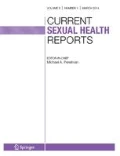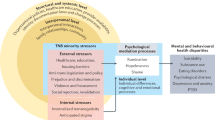Abstract
Purpose of Review
The goal of this paper is to give current understanding of non-binary/genderqueer identities, non-binary mental health trends and identity development, unique experiences of non-binary individuals, and recommendations for clinicians and researchers.
Recent Findings
About one third of individuals who identify as transgender primarily identify as non-binary. Recent studies found that non-binary people are at higher risk for suicide, experience more psychological distress, and experience higher levels of depression and anxiety. New studies on identity development of non-binary individuals provide explicit and fluid understandings of gender identity development outside of male/female, man/woman, and boy/girl.
Summary
Overall, little research is focused on non-binary individuals even though non-binary people make up a significant portion of the transgender community and experience even greater negative mental health risks. Non-binary people face several challenges in a society that is structured around binary gender identities. We encourage psychologists to challenge the dominant binary assumption about gender and create environments that include and affirm non-binary individuals.
Similar content being viewed by others
References
Papers of particular interest, published recently, have been highlighted as: • Of importance •• Of major importance
• Moradi B, Tebbe EA, Brewster ME, Budge SL, Lenzen A, Ege E, et al. A content analysis of literature on trans people and issues: 2002–2012. Couns Psychol. 2016;44(7):960–95. This article summarizes the literature on transgender people from 2002–2012
Budge SL. Genderqueer. In: The SAGE Encyclopedia of Psychology and Gender. Thousand Oaks, CA: SAGE.
• Singh AA, dickey lore m. Introduction. In: affirmative counseling and psychological practice with transgender and gender nonconforming clients. Washington, DC, US: 1. American Psychological Association; 2017. p. 4–18. A recent APA publication on affirming practice with transgender and gender nonconforming clients.
Brierley H. Gender identity and sexual behavior. In: Bisexuality in the United States: a social science reader. New York, NY: Columbia University Press; 2000. p. 104–26.
•• James SE, Herman JL, Rankin S, Keisling M, Mottet L, Anafi MA. The report of the 2015 US transgender survey. Washington: National Center for Transgender Equality; 2016. This study is the largest study on transgender adults in the US (N = 27,715) and discusses many of the current disparities transgender people face
Budge SL. Gender fluidity. In: The SAGE Encyclopedia of Psychology and Gender. Thousand Oaks, CA: SAGE.
Gilbert LA, Scher M. Gender and sex in counseling and psychotherapy. Wipf and Stock Publishers; 2009.
Morselli E, Frank AP, Santos RS, Fátima LA, Palmer BF, Clegg DJ. Sex and gender: critical variables in pre-clinical and clinical medical research. Cell Metab. 2016;24(3):520.
Budge SL, Thai JL. Coming out processes for transgender people. In: The SAGE Encyclopedia of Psychology and Gender. Thousand Oaks, CA: SAGE;
Hunt S. An introduction to the health of two-spirit people: historical, contemporary and emergent issues. National Collaborating Centre for Aboriginal Health: Prince George, BC; 2016.
Epple C. Coming to terms with Navajo Nádleehí: a critique of Berdache,“gay,” “alternate gender,” and “two-spirit”. Am Ethnol. 1998;25(2):267–90.
Robinson M. Two-spirit and bisexual people: different umbrella, same rain. Journal of Bisexuality. 2017;17(1):7–29.
Stryker S. Transgender history. Seal Press; 2008.
• Budge SL, Rossman HK, Howard KA. Coping and psychological distress among genderqueer individuals: the moderating effect of social support. Journal of LGBT Issues in Counseling. 2014;8(1):95–117. This study is one of a few focused on non-binary/genderqueer mental health
• Harrison J, Grant J, Herman JL. A gender not listed here: genderqueers, gender rebels, and otherwise in the national transgender discrimination survey. LGBTQ Public Policy Journal at the Harvard Kennedy School. 2012;2(1):13–24. This article examines the experiences and mental health profiles of those who did not identify as male or female on the National Transgender Discrimination Survey
Budge SL, Salkas S. An overview of non-binary gender identities in the national transgender discrimination survey. 2016.
Burdge BJ. Bending gender, ending gender: theoretical foundations for social work practice with the transgender community. Soc Work. 2007;52(3):243–50.
Hendricks ML, Testa RJ. A conceptual framework for clinical work with transgender and gender nonconforming clients: an adaptation of the minority stress model. Professional Psychology-Research and Practice. 2012;43(5):460.
•• American Psychological Association. Guidelines for psychological practice with transgender and gender nonconforming people. The American Psychologist. 2015;70(9):832. These guidelines can help clinicians use affirming practices with transgender clients
Burnes TR, Singh AA, Harper AJ, Harper B, Maxon-Kann W, Pickering DL, et al. American Counseling Association: competencies for counseling with transgender clients. Journal of LGBT Issues in Counseling. 2010;4(3–4):135–59.
Webb, A, Matsuno, EP, Budge, SL, Krishnan, MC, Balsam, KF. Non-binary gender identities. The society for the psychological study of lesbian, gay, bisexual, and transgender Issues. 2017. http://www.apadivisions.org/division 44/resources/advocacy/non-binary-facts.pdf.
Bockting WO, Coleman E. 8 developmental stages of the transgender coming-out process: principles of transgender medicine and surgery. 2016:137.
Devor AH. Witnessing and mirroring: a fourteen stage model of transsexual identity formation. Journal of Gay & Lesbian Psychotherapy. 2004;8(1–2):41–67.
Kohlberg L. A cognitive-developmental analysis of children’s sex-role concepts and attitudes. The development of sex differences. Stanford, CA: Stanford University Press; 1966.
Budge SL, Katz-Wise SL, Tebbe EN, Howard KA, Schneider CL, Rodriguez A. Transgender emotional and coping processes facilitative and avoidant coping throughout gender transitioning. Couns Psychol. 2013;41(4):601–47.
Alexander D, Orovecz J, Salkas S, Stahl A, Budge SL. Internal identity processes for individuals with non-binary identities. Denver, CO: Oral presentation at: American Psychological Association Annual Convention; 2016.
Budge SL, Singh S, Mauk E, Fearing-Kabler A. Societal and contextual factors influencing mental health experiences of individuals with non-binary gender identities. Unpublished Manuscript.
Kuper LE, Nussbaum R, Mustanski B. Exploring the diversity of gender and sexual orientation identities in an online sample of transgender individuals. Journal of sex research. 2012;49(2–3):244–54.
Bilodeau BL, Renn KA. Analysis of LGBT identity development models and implications for practice. New Dir Stud Serv. 2005;2005(111):25–39.
Budge SL, Tebbe EN, Howard KA. The work experiences of transgender individuals: negotiating the transition and career decision-making processes. J Couns Psychol. 2010;57(4):377.
• Testa RJ, Habarth J, Peta J, Balsam K, Bockting W. Development of the gender minority stress and resilience measure. Psychology of Sexual Orientation and Gender Diversity. 2015;2(1):65. This study discusses the development and validation of an important measure of gender minority stress and resilience for transgender populations
Israel T, Mohr JJ. Attitudes toward bisexual women and men: current research, future directions. Journal of Bisexuality. 2004;4(1–2):117–34.
Ross LE, Dobinson C, Eady A. Perceived determinants of mental health for bisexual people: a qualitative examination. Am J Public Health. 2010;100(3):496–502.
Sarfaty AN. Not trans enough: the intersections of whiteness & non-binary gender identity [thesis]. 2016.
Brill SA, Kenney L. The transgender teen: a handbook for parents and professionals supporting transgender and non-binary teens. Jersey City: Cleis Press; 2016.
Singh A. The queer and transgender resilience workbook: skills for navigating sexual orientation and gender expression: New Harbinger Publications; 2018.
Testa RJ, Coolhart D, Peta J. The gender quest workbook: a guide for teens and young adults exploring gender identity. Oakland: New Harbinger Publications; 2016.
Author information
Authors and Affiliations
Corresponding author
Ethics declarations
Conflict of Interest
Emmie Matsuno and Stephanie L. Budge each declare no potential conflicts of interest.
Human and Animal Rights and Informed Consent
This article contains no studies with human or animal subjects performed by any of the authors.
Additional information
This article is part of the Topical Collection on Variations in Orientation, Identity, Addiction, and Compulsion
Rights and permissions
About this article
Cite this article
Matsuno, E., Budge, S.L. Non-binary/Genderqueer Identities: a Critical Review of the Literature. Curr Sex Health Rep 9, 116–120 (2017). https://doi.org/10.1007/s11930-017-0111-8
Published:
Issue Date:
DOI: https://doi.org/10.1007/s11930-017-0111-8




